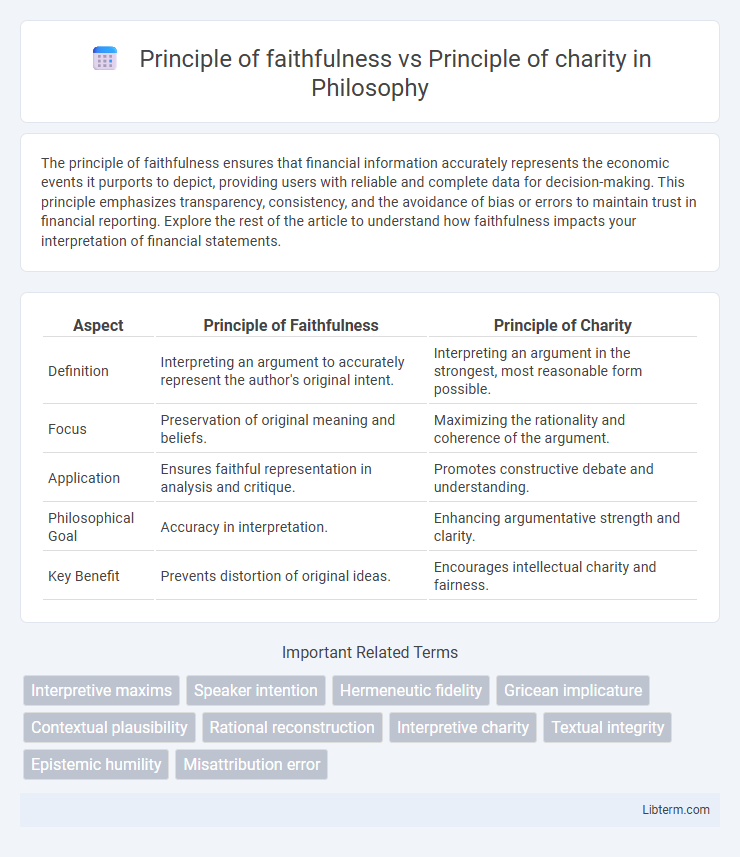The principle of faithfulness ensures that financial information accurately represents the economic events it purports to depict, providing users with reliable and complete data for decision-making. This principle emphasizes transparency, consistency, and the avoidance of bias or errors to maintain trust in financial reporting. Explore the rest of the article to understand how faithfulness impacts your interpretation of financial statements.
Table of Comparison
| Aspect | Principle of Faithfulness | Principle of Charity |
|---|---|---|
| Definition | Interpreting an argument to accurately represent the author's original intent. | Interpreting an argument in the strongest, most reasonable form possible. |
| Focus | Preservation of original meaning and beliefs. | Maximizing the rationality and coherence of the argument. |
| Application | Ensures faithful representation in analysis and critique. | Promotes constructive debate and understanding. |
| Philosophical Goal | Accuracy in interpretation. | Enhancing argumentative strength and clarity. |
| Key Benefit | Prevents distortion of original ideas. | Encourages intellectual charity and fairness. |
Introduction to Faithfulness and Charity in Interpretation
The Principle of Faithfulness requires interpreters to represent a speaker's or author's intentions and statements accurately without distortion or misrepresentation. The Principle of Charity involves interpreting statements in the most rational and coherent way possible, often attributing the best possible meaning to ambiguous or unclear expressions. Both principles guide effective interpretation by balancing fidelity to the original message with constructive understanding.
Defining the Principle of Faithfulness
The Principle of Faithfulness requires accurately representing the original meaning, intent, and context of a speaker's or author's message without distortion. This principle ensures that interpretations remain true to the source material, avoiding misrepresentation or selective omission. By preserving the original content's integrity, the Principle of Faithfulness fosters honest and reliable communication in argumentation and analysis.
Understanding the Principle of Charity
The Principle of Charity involves interpreting others' statements in the most rational and coherent way possible, attributing the strongest plausible meaning to their arguments. This approach enhances mutual understanding by assuming sincerity and logical consistency, which helps avoid misrepresentation and fosters more productive dialogue. Applying the Principle of Charity is essential in critical thinking and philosophical analysis to fairly evaluate opposing viewpoints.
Historical Context and Philosophical Roots
The principle of charity, originating in the works of philosophers like David Hume and later expanded by Donald Davidson, emphasizes interpreting others' statements in the most rational and coherent way possible to facilitate understanding and constructive dialogue. In contrast, the principle of faithfulness prioritizes accurately representing an argument or belief as its proponent intended, preserving the original meaning without distortion or unwarranted interpretation. These principles arise from the historical pursuit of clear communication and intellectual honesty in philosophical discourse, reflecting differing priorities between empathetic interpretation and strict fidelity to original intent.
Key Differences between Faithfulness and Charity
The Principle of Faithfulness emphasizes accurately representing a speaker's or author's original meaning, avoiding distortion or misinterpretation of their intended message. In contrast, the Principle of Charity involves interpreting statements in the most rational and coherent way possible, often attributing truth and logical consistency to ambiguous or flawed arguments. The key difference lies in faithfulness prioritizing exactness to the original intent, while charity prioritizes reasonable and constructive interpretation to promote understanding.
Benefits of Applying the Principle of Faithfulness
Applying the Principle of Faithfulness ensures accurate interpretation by representing others' views truthfully, preserving the original intent and meaning. This approach enhances constructive dialogue, reduces misunderstandings, and fosters intellectual integrity in discussions. Faithfulness supports critical analysis by grounding arguments in the speaker's actual position rather than distorted versions.
Advantages of Adopting the Principle of Charity
Adopting the Principle of Charity promotes constructive dialogue by interpreting others' statements in their strongest, most rational form, reducing misunderstandings and fostering mutual respect. This approach enhances critical thinking and argumentative clarity, as it encourages engaging with the best possible version of opposing views rather than weak or distorted arguments. Emphasizing genuine comprehension helps build collaborative environments in academic, philosophical, and everyday discussions, ultimately leading to more productive and meaningful exchanges.
Common Challenges and Conflicts
The Principle of Faithfulness emphasizes accurately representing an opponent's argument without distortion, often leading to challenges in balancing thoroughness and brevity. The Principle of Charity requires interpreting arguments in their strongest, most rational form, which can conflict with Faithfulness by risking oversimplification or misrepresentation. Common conflicts arise when attempts to be charitable inadvertently alter original meanings, complicating fair and constructive discourse analysis.
Practical Examples in Argument Analysis
The Principle of Faithfulness in argument analysis involves interpreting a speaker's statements in a way that accurately reflects their original intent without distortion, ensuring the argument is represented as genuinely as possible. The Principle of Charity requires interpreting unclear or ambiguous statements in the most rational and coherent way, attributing the strongest possible interpretation to avoid unfair criticism. In practical examples, applying faithfulness means quoting a source precisely, while charity involves reconstructing an argument to enhance clarity and logical consistency, such as rephrasing ambiguous claims to their most reasonable form.
Choosing the Appropriate Principle for Interpretation
Choosing the appropriate principle for interpretation depends on the context and goals of analysis; the Principle of Faithfulness prioritizes accurately representing the original meaning and intent of the speaker or text, ensuring fidelity to their explicit statements. In contrast, the Principle of Charity involves interpreting statements in the most rational and coherent way possible, often attributing the strongest, most reasonable meaning to avoid misunderstanding or misrepresentation. Balancing these principles requires assessing whether preserving original intent or maximizing interpretative clarity better serves constructive dialogue or critical evaluation.
Principle of faithfulness Infographic

 libterm.com
libterm.com